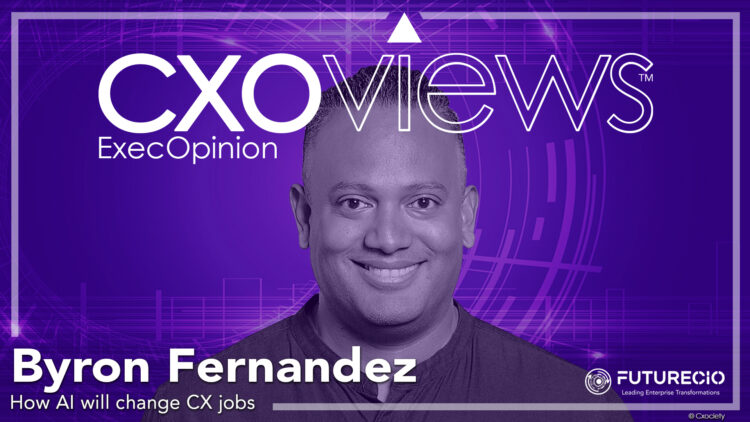“It will change how companies deliver value to their customers, and it will supercharge productivity. In some industries, these transformations will lead to the emergence of entirely new business models.” Bain & Company
It is hypothesised that an intelligent agent could provide customised conversational decision-making support to help customers find their dream car and automate meal-planning or grocery shopping.
The use cases are waiting to be imagined. This quest to find the right use case is reflected in discussions Cxociety has been having with senior leaders in Asia.
Asked how AI will impact current roles and responsibilities within the organisation, Byron Fernandez, EVP and Group CIO at TDCX concedes that AI will be a mainstay for companies. He posits that organisations are looking to redesign job roles for humans to work alongside AI.
Advantages of AI
He cites AI offers several advantages including reducing the time spent on repetitive tasks and providing greater fulfilment for the human workforce by focusing on higher-value work that requires domain knowledge and critical thinking skills.
In the customer experience (CX) sector, studies indicate that AI-powered chat assistants enable agents to resolve more issues per hour, translating to greater productivity. Agents are provided recommended solutions and spend their time assessing the quality and accuracy of the information, rather than searching for the information.
“Here’s where AI knowledge bases shine: not only do they capture static repositories of information such as FAQs or articles, but they also learn from various interactions agents have had with customers, enhancing their capability to deliver precise and beneficial information for agents over time. This not only achieves higher but faster success rates in resolving issues,” he added.
Improving employee satisfaction and engagement
According to Fernandez customer experience professionals play a crucial role for organisations and in many cases, often serve as frontline representatives to ensure a positive experience for end customers.
He contends that while helping to resolve customer issues, they are also required to manage operational tasks such as documenting customer interactions and guiding customers through problem-solving steps.
“With the integration of AI, agents can shift their focus to more enriching work. That means being able to work on more complex tasks (e.g. KYC checks or negotiation cases) that require more problem-solving instead of dealing with routine tasks,” he elaborates.
However, to excel in these tasks, agents require enhanced digital literacy, such as the ability to use collaborative tools, to navigate digital interfaces and to interpret and derive meaningful insights from data analysis.
“Upskilling employees plays a crucial role here, as it is not just about keeping up with change but also unlocking the full potential of the workforce,” said Fernandez. “By equipping employees with the skills, they need to thrive, they become more employable, contribute more meaningfully to the organisational goals, and experience greater job satisfaction as they feel valued and fulfilled.”
He posits that this positive cycle benefits everyone – employees, the organisation, and ultimately, customers.
There are of course limits to what technology, even AI, can do. Fernandez acknowledges that while AI excels at data analysis and task automation, it cannot replicate the emotive aspect.
“Interpersonal skills such as effective communication and the occasional need to make judgment calls when solving issues – especially in high-tension moments - will continue to be crucial skills for agents,” he added.
Implementing AI in the workplace – things to know
AI is still evolving, albeit faster than previously thought possible, with possibilities still being dreamed of. Fernandez explains that current iterations of AI, even those in their fledgling stages, are driving transformations at workplaces across the world.
“While the opportunities abound, concerns remain about the potential for inaccuracy, bias and intellectual property and data privacy violations when using data sets from Large Language Models (LLMs),” cautioned Fernandez.
He pointed out that data integrity is a key issue to get right. The presence of inaccurate data in foundational models can lead to complex operational issues down the line, he added.

“There are economic concerns for enterprises too as AI adoption necessitates significant business model changes and workforce transitions, posing a pressing question that can impact the bottom line – are companies well-equipped to integrate AI into their business model?“
Byron Fernandez
AI’s impact on workflows
Technology has always heralded a change in how things are done. However, whereas in the past, people will need to adjust to how IT dictates work needs to be done, there is a clear
Fernandez believes that AI technologies will become an integral part of daily operations rather than standalone tools. “In the CX space, as AI takes over routine tasks (e.g. answering FAQs, data entry, verification calls), decision-making shifts closer to the frontlines,” he posits.
He goes on to add that trickier questions that may be more challenging for AI would call for human expertise support. “With the right AI-enabled tools and dashboards, frontline employees can access relevant information and insights directly,” Fernandez adds.
‘In some cases, they can even identify issues before customers lodge complaints. This shift requires new skillsets for employees as data analytics skills become prevalent, necessitating a strategic investment in training and development to future-ready the workforce.”
Byron Fernandez
“As it unlocks new levels of efficiency and innovation, this transformation encourages employees to engage in more cognitive tasks, while introducing new job roles for specialists in AI integration, training, maintenance and roles that may extend beyond our current imagination,” concludes Fernandez.
The integration conundrum

“We’re witnessing a pivotal moment in AI unfold right before our very eyes,” says Christina McAllister, a senior analyst at Forrester. She suggests that enterprises absolutely can and should experiment with this technology. “But just know that that’s what you’re doing: experimenting,” she quips.
The bigger challenge, we posit (at FutureCIO) is integration. Most organisations have existing legacy processes. Some may even be in varying stages of modernisation before the hype around AI pr even as the AI hype unfolds.
How would you successfully integrate an evolving technology without messing up operations?
Fernandez concedes that successful integration does not come easy. One of the primary hurdles lies in striking the right balance between automation and the human touch, he starts. “Customers often seek empathy and understanding, qualities that AI, no matter how advanced, might struggle to replicate convincingly,” he continues.
TDCX addresses this with its FastTrack solution, an AI-enabled productivity platform designed to help customer service (CS) agents automate multiple processes (e.g. transcribing, providing potential solutions) and to equip them with information at their fingertips in real-time. To safeguard the customer experience, it is intentionally designed to have humans in the loop.
“Overall, AI integration is a powerful tool for enhancing productivity and efficiency,” says Fernandez. “How each business decides on where to deploy AI will depend on their unique business needs and existing systems.”
He believes that a comprehensive analysis is crucial to pinpoint the most impactful uses of AI. “While AI complements what many companies do, it is no replacement for the human touch in creating a personalised customer experience,” he concludes.




